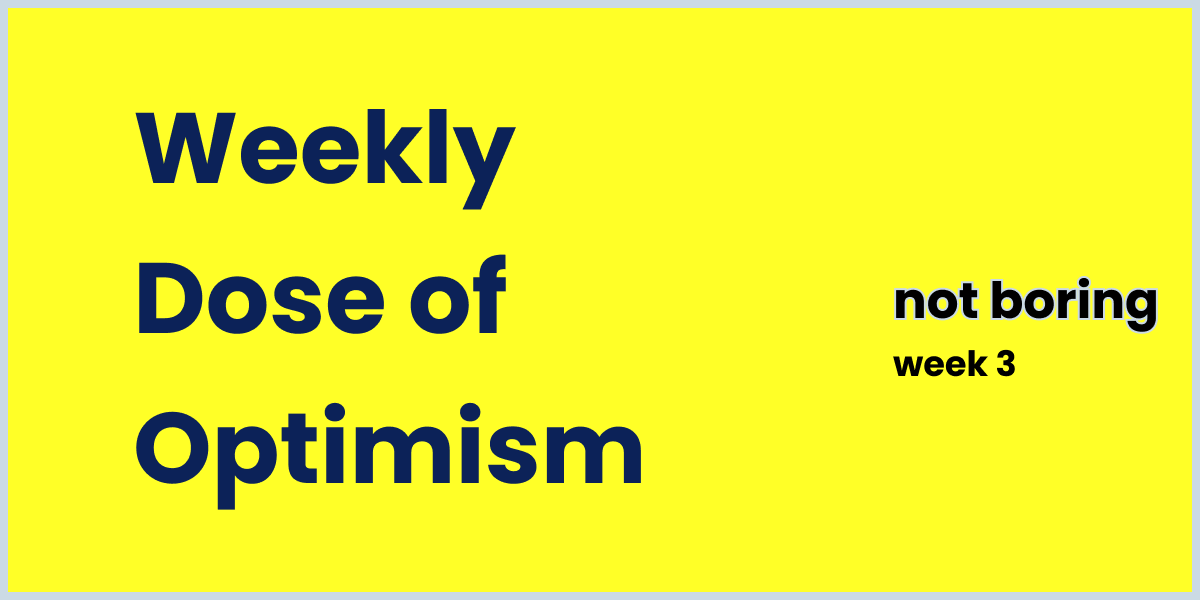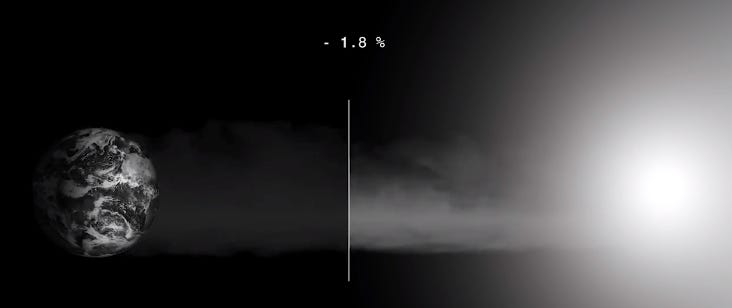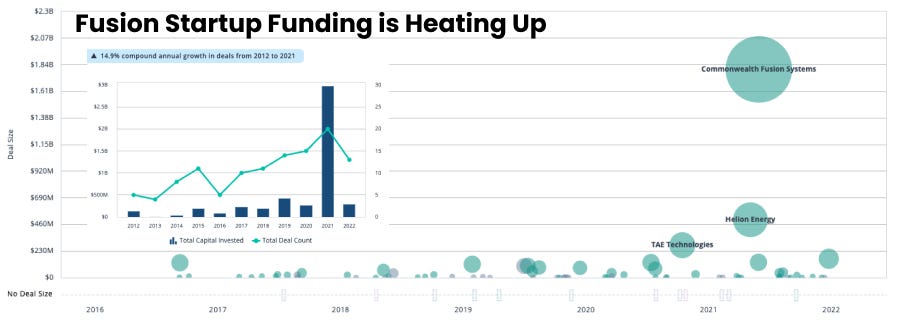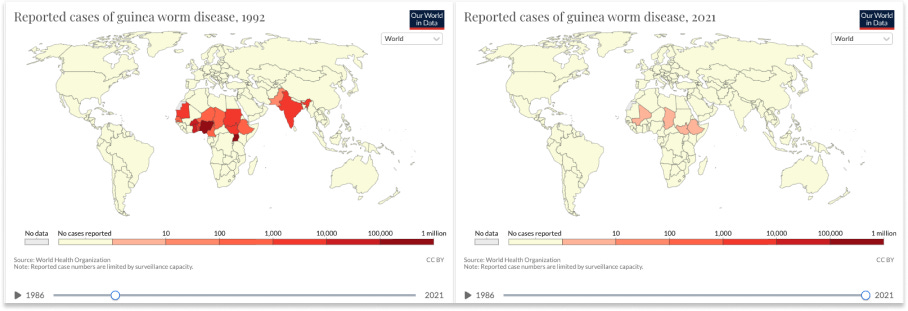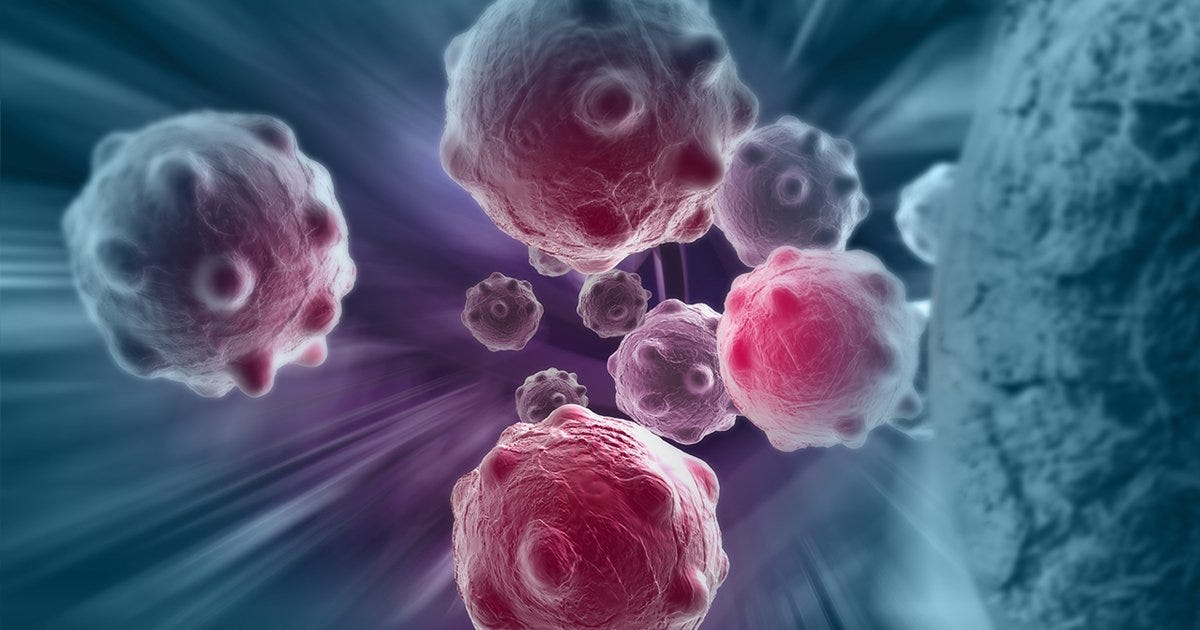Not Boring by Packy McCormick - Weekly Dose of Optimism #3
Come for the Optimism, stay for the in-depth analyses of tech companies and trends: Hi friends 👋, Happy Friday! We’re back with the third Weekly Dose of Optimism. Not Boring’s mission is to make the world more optimistic. While the daily headlines can be bleak, and often reflect the genuinely bad and messy things that happen every day, humans keep fighting our way forward. This weekly dose of optimism is a little attempt to highlight some of the progress we’re making. Based on feedback last time:
Let’s get to it. Week 3: July 15, 2022(1) First Images from the James Webb Space Telescope
The release of the first images from the James Webb Space Telescope have rightfully captured the world’s attention over the past week. The images are so powerful because they’re simultaneously a reminder of how tiny we are in the scheme of the universe and how unique and incredible we are. Tiny. That image on the right of SMACS 0723 is a cluster of whole galaxies that represent a fraction of the sky that’s “approximately the size of a grain of sand held at arm's length, a tiny sliver of the vast universe.” The images show light emitted as long as 13 billion years ago, less than a billion years after the Big Bang. Each of us, if we’re lucky, will live for 0.0000007246% of the history of the universe to date, on a planet that inhabits 0.00000000000000000000000000000000000003% of the total mass of the universe (and on a small sliver of that planet, no less). Unique and Incredible. Somehow, despite our numerical insignificance, humans have been able to build tools to see into the deepest nooks and crannies of the universe, to essentially look backwards in time billions of years, using just the resources available to us on this little planet. We’re the only intelligent life that we know of in the universe. And we’re gearing up to begin our expansion to Mars and beyond. All of that progress is based on centuries of compounding human experimentation and knowledge, and our knowledge is compounding faster than ever. Humans rock. (2) Space Bubbles Might Be an Emergency Solution to Climate Change From: MIT Senseable City Lab Submitted by: Dhruv Sarin
Space research and exploration benefits Earth, too. A cross-disciplinary team at MIT has developed an “easily deployable and fully reversible” tool to deflect solar radiation: Space Bubbles. The bubbles could be manufactured directly in outer space, forming an extensive deflective raft positioned at the Lagrangian Point between the Earth and the Sun, where the gravity of the two bodies counteract each other such that small bodies (like space bubbles) will remain approximately at rest relative to them. In English, that means that we can make space bubbles in space and form them into radiation-blocking shields that would remain where they’re supposed to relative to the earth. While Space Bubbles are an emergency solution, and aren’t a replacement for other climate change mitigation efforts (they wouldn’t give us that cheap, abundant energy we need anyway), it’s nice to know that we have potential backup plans. (3) Power Moves: Why Private Billions Are Flowing Into Fusion (Video) By: Alan Jeffries for Bloomberg
Nuclear fusion — “the process by which two light atomic nuclei combine to form a single heavier one while releasing massive amounts of energy” — is the holy grail energy source. Fusion is how the sun makes energy, and harnessing it would be a major step towards cheap, abundant energy. Historically, government-funded research has driven progress in the field. Today, fusion startups are getting more funding than ever before, with 20 deals representing $2.98 billion in funding in the space in 2021, including Commonwealth Fusion Systems’ $1.8 billion Series B in December. The video highlights startups General Fusion, Helion, and First Light Fusion. Fusion is experiencing the classic government-private sector tug-of-war that Rahul wrote about in Making Moonshots — startups feel that government research will be too slow to get to Net Gain at scale, and government-backed researchers feel that many startups are taking approaches that won’t work and promising overly aggressive timelines. As the narrator highlights, solving commercial fusion will take both research and commercialization. However it happens, it seems that there’s consensus that we’re at most two to three decades away, which is mind-blowing, and could help bring about the benefits of abundant energy that both Eli Dourado & Austin Vernon and Cleo Abram & Matt Yglesias describe well. (4) Guinea worm disease is close to being eradicated – how was this progress achieved? By: Saloni Dattani and Fiona Spooner for Our World in Data Submitted by: Titian Steiger
“Guinea worm disease is a painful and debilitating disease that used to be common in Asia, the Middle East, and many countries in Africa. It’s now close to being eradicated worldwide. This success is thanks to an eradication program that has focused on water treatment and filtration, public education, and providing safe sources of drinking water to reduce its spread.” The first three pieces in this newsletter are about making progress by pushing the frontiers of science. This one is about applying things that we’ve known for a long time. In the 1980s, there were nearly a million cases of Guinea worm disease per year. That’s a big number, but what it means is that each year, a million humans swallowed parasitic eggs that “mature into adult worms – with female worms growing up to around a meter in length – and crawl through people’s connective tissue, joints, and bones.” One in 200 of them were left with a permanent debilitating disease. And now, through education and clean water, the disease is all but gone, with only 15 reported cases last year. (5) 6 Breakthroughs Defeating Cancer By: Peter Diamandis Submitted by: Brad Power
Fuck cancer. This year, approximately 9.5 million people around the world will die from cancer. In the US alone, there will be about 1.9 million new cases this year, and about one-third of those people will die from cancer this year. And it’s personal: almost everyone reading this knows someone close to them afflicted by cancer. But this piece suggests that “there are reasons to believe we can cure it within the next 10 years” and lays out 6 promising treatments to track:
Many of these treatments are promising but still early — tested in mice or small groups of humans — but they’re worth following. Personally, I’m excited to see the prevention and treatments, for cancer and beyond, made possible by the dramatically declining cost of genetic sequencing. Yesterday, Not Boring Capital portfolio company Nucleus announced its $14 million Seed+ from 776, Founders Fund, Shrug, and more to put “a human genome on every smartphone.” Bonus: For All Mankind on Apple TV+ Given all of the focus on space this week, this feels like the right time to recommend my latest streaming obsession: For All Mankind. The show “imagines a world where the space race never ended.” As we’ve written about before, this year marks the 50 year anniversary of the last time a human set foot on the moon. For All Mankind presents an alternate history, one in which NASA, Russia, and private companies continue to travel to the moon, and beyond. The show fits this newsletter’s optimism theme so well because while it celebrates human progress, it also presents all of the challenges and fights and struggles that arise in space and at home in the pursuit. Progress is bumpy, but it’s important. Double Bonus: Arkive’s Tom McCleod on Not Boring Founders We talk about a lot of science, but I’m excited about the world getting more fun, collaborative, and culturally rich, too. This week, Not Boring Capital portfolio company Arkive announced its $9.7 million Seed “to build the world’s first decentralized physical museum curated & operated by its members.” Its first purchase is the patent for the ENIAC computer. As humans produce more amazing culture and knowledge, Arkive will buy them and make sure they’re on public display for more people to learn from. Listen to the episode with Tom to learn more and get involved. Good work out there this week, fellow humans. We can’t find all of the best things humanity accomplished every week on our own — help us out by submitting the things you come across that make you most optimistic here. Have a great weekend! Packy If you liked this post from Not Boring by Packy McCormick, why not share it? |
Older messages
The Good Thing About Hard Things
Monday, July 11, 2022
Software has spent a decade eating the world. What's next?
Weekly Dose of Optimism
Friday, July 8, 2022
Week 2
Making Moonshots
Thursday, July 7, 2022
Rahul Rana joins Not Boring to discuss the history and future of deeptech
The Founder's Letter: Jordan Singer, Diagram
Thursday, June 30, 2022
On Design
Web3 Use Cases: The Future
Monday, June 27, 2022
Will web3 justify the hype?
You Might Also Like
🔮 $320B investments by Meta, Amazon, & Google!
Friday, February 14, 2025
🧠 AI is exploding already!
✍🏼 Why founders are using Playbookz
Friday, February 14, 2025
Busy founders are using Playbookz build ultra profitable personal brands
Is AI going to help or hurt your SEO?
Friday, February 14, 2025
Everyone is talking about how AI is changing SEO, but what you should be asking is how you can change your SEO game with AI. Join me and my team on Tuesday, February 18, for a live webinar where we
Our marketing playbook revealed
Friday, February 14, 2025
Today's Guide to the Marketing Jungle from Social Media Examiner... Presented by social-media-marketing-world-logo It's National Cribbage Day, Reader... Don't get skunked! In today's
Connect one-on-one with programmatic marketing leaders
Friday, February 14, 2025
Enhanced networking at Digiday events
Outsmart Your SaaS Competitors with These SEO Strategies 🚀
Friday, February 14, 2025
SEO Tip #76
Temu and Shein's Dominance Is Over [Roundup]
Friday, February 14, 2025
Hey Reader, Is the removal of the de minimis threshold a win for e-commerce sellers? With Chinese marketplaces like Shein and Temu taking advantage of this threshold, does the removal mean consumers
"Agencies are dying."
Friday, February 14, 2025
What this means for your agency and how to navigate the shift ͏ ͏ ͏ ͏ ͏ ͏ ͏ ͏ ͏ ͏ ͏ ͏ ͏ ͏ ͏ ͏ ͏ ͏ ͏ ͏ ͏ ͏ ͏ ͏ ͏ ͏ ͏ ͏ ͏ ͏ ͏ ͏ ͏ ͏ ͏ ͏ ͏ ͏ ͏ ͏ ͏ ͏ ͏ ͏ ͏ ͏
Is GEO replacing SEO?
Friday, February 14, 2025
Generative Engine Optimization (GEO) is here, and Search Engine Optimization (SEO) is under threat. But what is GEO? What does it involve? And what is in store for businesses that rely on SEO to drive
🌁#87: Why DeepResearch Should Be Your New Hire
Friday, February 14, 2025
– this new agent from OpenAI is mind blowing and – I can't believe I say that – worth $200/month
